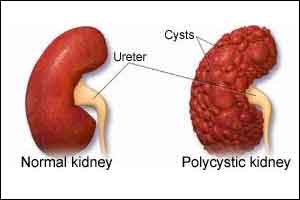- Home
- Editorial
- News
- Practice Guidelines
- Anesthesiology Guidelines
- Cancer Guidelines
- Cardiac Sciences Guidelines
- Critical Care Guidelines
- Dentistry Guidelines
- Dermatology Guidelines
- Diabetes and Endo Guidelines
- Diagnostics Guidelines
- ENT Guidelines
- Featured Practice Guidelines
- Gastroenterology Guidelines
- Geriatrics Guidelines
- Medicine Guidelines
- Nephrology Guidelines
- Neurosciences Guidelines
- Obs and Gynae Guidelines
- Ophthalmology Guidelines
- Orthopaedics Guidelines
- Paediatrics Guidelines
- Psychiatry Guidelines
- Pulmonology Guidelines
- Radiology Guidelines
- Surgery Guidelines
- Urology Guidelines
Kidney disease increases risk of diabetes : Study

Diabetes is known to increase a person's risk of kidney disease. Now, a new study from Washington University School of Medicine in St. Louis suggests that the converse also is true: Kidney dysfunction increases the risk of diabetes.
Further, the researchers deduced that a likely culprit of the two-way relationship between kidney disease and diabetes is urea. The nitrogen-containing waste product in blood comes from the breakdown of protein in foods. Kidneys normally remove urea from the blood, but it can build up when kidney function slows down.
The findings are significant because urea levels can be lowered through medication, diet -- for example, by eating less protein -- and other means, thereby allowing for improved treatment and possible prevention of diabetes.
The epidemiological study, conducted in collaboration with the Veterans Affairs St. Louis Health Care System, is published in Kidney International.
"We have known for a long time that diabetes is a major risk factor for kidney disease, but now we have a better understanding that kidney disease, through elevated levels of urea, also raises the risk of diabetes," said the study's senior author Ziyad Al-Aly, MD, an assistant professor of medicine at Washington University. "When urea builds up in the blood because of kidney dysfunction, increased insulin resistance and impaired insulin secretion often result."
In collaboration with scientists at the St. Louis Veterans Affairs' Clinical Epidemiology Center, Washington University researchers examined medical records in national VA databases to dissect the relationship between kidney disease and diabetes. They evaluated the records of 1.3 million adults without diabetes over a five-year period, beginning in 2003.
A common blood test that measures the amount of urea nitrogen found in the blood showed that 117,000 of those without diabetes -- or 9 percent -- had elevated urea levels, signaling poor kidney function.
"That figure -- 9 percent of people with high urea levels -- remained relatively constant over time," Al-Aly said. "It is also reflective of the general population."
Overall, he said, those with high urea levels had a 23 percent higher risk of diabetes -- a figure researchers determined by comparing risk between those with high and low urea levels. In each year studied, the researchers documented new cases of diabetes in 2,989 of every 100,000 people with low urea levels and 3,677 new cases of diabetes among those with high urea levels.
"The risk difference between high and low levels is 688 cases of diabetes per 100,000 people each year," Al-Aly said. "This means that for every 100,000 people, there would be 688 more cases of diabetes each year in those with higher urea levels."
Al-Aly said he was inspired to delve into the relationship between diabetes and kidney disease after reading a mouse study published in the August 2016 Journal of Clinical Investigation. As part of the study, researchers from the University of Montreal Hospital Research Centre in Canada induced kidney failure in mice. Subsequently, many of the animals experienced elevated urea levels, resulting in insulin resistance and impaired insulin secretion.
"I read the study with excitement and intrigue, and I thought, 'We have to test this in humans,' " Al-Aly recalled. "Our results were almost an exact replica of the mouse study. The results showed a clear relationship between urea levels and risk of diabetes."

Disclaimer: This site is primarily intended for healthcare professionals. Any content/information on this website does not replace the advice of medical and/or health professionals and should not be construed as medical/diagnostic advice/endorsement or prescription. Use of this site is subject to our terms of use, privacy policy, advertisement policy. © 2020 Minerva Medical Treatment Pvt Ltd